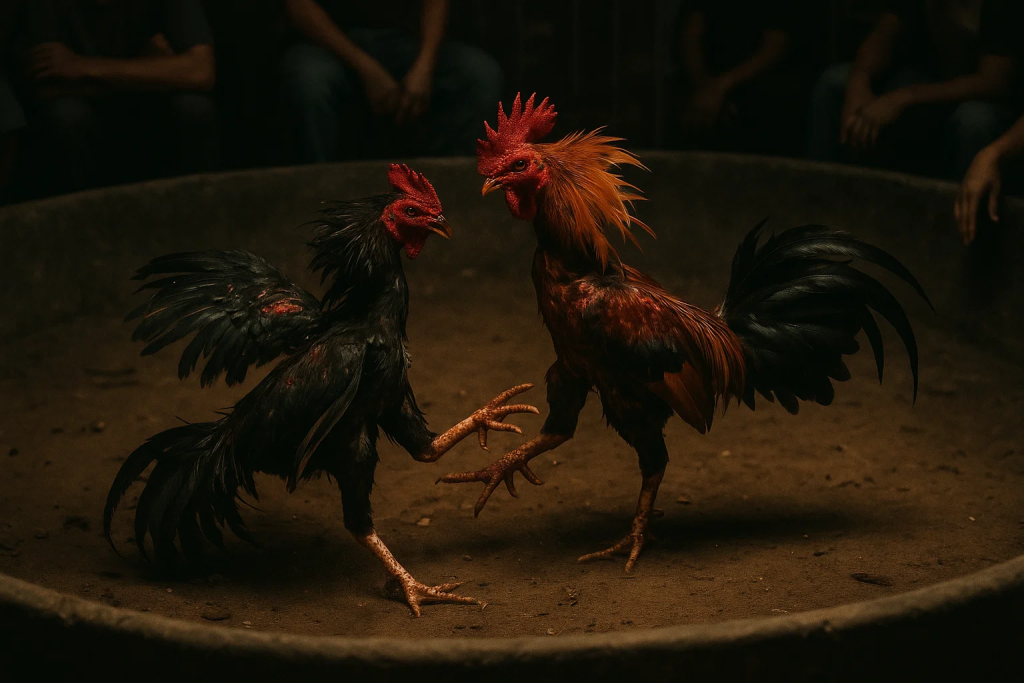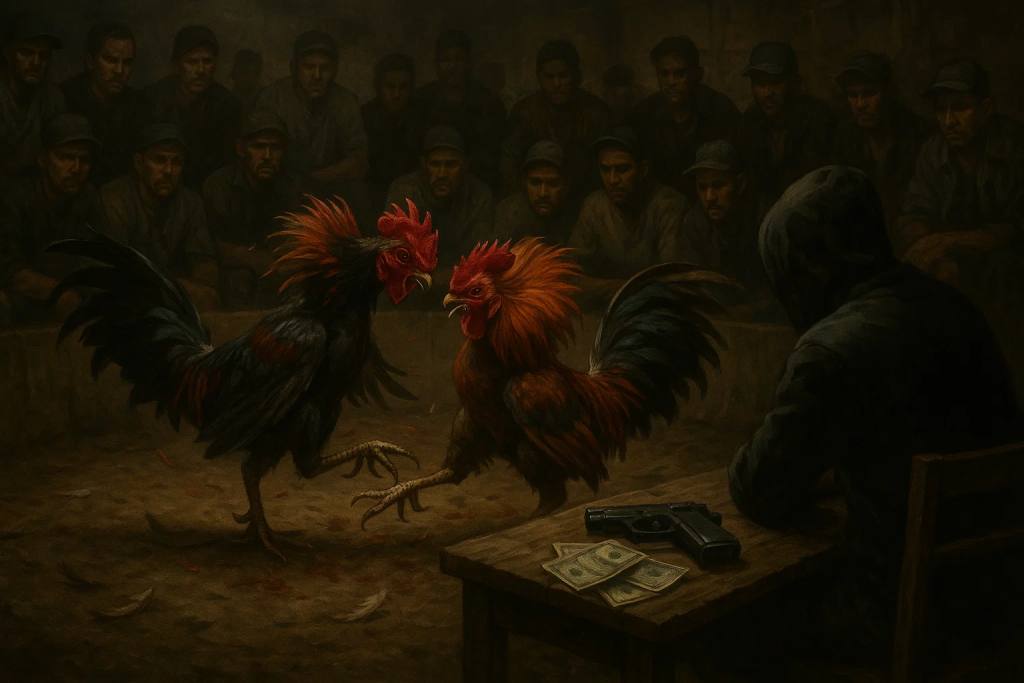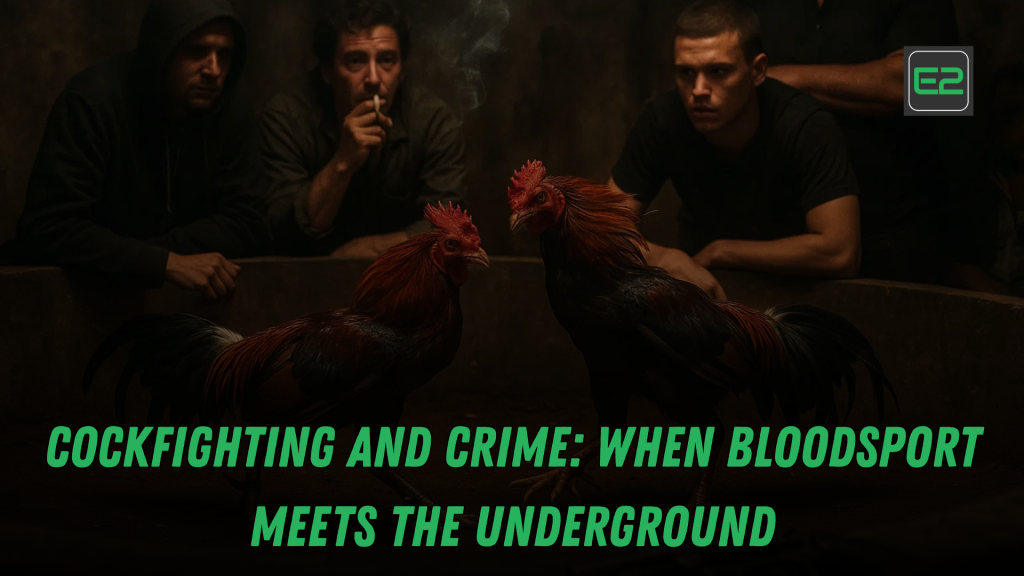Table of Contents
In this article, we will explore the connection between cockfighting and crime, examining the illicit world of bloodsports and how they intertwine with underground networks, gambling, and organized crime. We’ll also discuss the legal ramifications, ethical concerns, and why many countries are taking action to curb the practice.
Cockfighting has a long and complex history, deeply rooted in various cultures around the world. Once considered a traditional sport in many regions, it has evolved over time to become something far darker—often associated with underground gambling and crime. While some still view it as a cultural pastime, the intersection of cockfighting and criminal activity raises significant concerns about its impact on society.
The History and Evolution of Cockfighting
Cockfighting dates back to ancient times, with records of the sport found in civilizations such as Ancient Greece, Rome, and China. It became a widespread practice in Southeast Asia, India, and parts of Europe. Historically, it was seen as a form of entertainment and a symbol of strength, bravery, and resilience. In some cultures, it was even associated with religious rites or tribal traditions.
However, as the centuries passed, the sport began to attract increasing scrutiny. While some countries still view it as part of their cultural heritage, many have started to impose strict regulations or outright bans. Despite these efforts, cockfighting has continued to thrive, albeit in more clandestine environments.
The Role of Gambling in Cockfighting
One of the major factors that have contributed to cockfighting’s persistence, especially in its underground form, is gambling. Cockfights are often staged with large sums of money bet on the outcome, creating a high-stakes atmosphere that attracts individuals seeking to make quick profits. This financial incentive turns cockfighting into a business venture for some, with entire illegal networks dedicated to organizing these bloodsports.
Gambling on cockfighting often takes place in private arenas, where participants place bets on their roosters based on their perceived strength, fighting ability, or previous victories. The money and illegal activities surrounding these events often make them a breeding ground for other criminal behavior.

Cockfighting and the Rise of Organized Crime
When bloodsport becomes intertwined with gambling, it opens the door to organized crime. This is especially true in regions where cockfighting is not only illegal but is a thriving underground industry. Many criminal groups exploit the sport to further their activities, using it as a means of money laundering, human trafficking, or even illegal drug trade operations.
Money Laundering Crime and Cockfighting
One of the ways organized crime syndicates exploit cockfighting is through money laundering. Criminal organizations can use cockfighting events to clean dirty money, funneling large sums through betting schemes, prize money distributions, and illegal wagering. By running these operations under the guise of a legitimate sport, they can avoid detection by authorities.
This connection between cockfighting and financial crime becomes a significant issue, especially in areas where law enforcement is less vigilant or lacks the resources to investigate these underground operations thoroughly. Cockfighting rings can serve as a cover for a variety of illegal transactions, including the movement of cash that originates from criminal enterprises.
The Link to Human Trafficking
In some extreme cases, cockfighting rings have been known to be linked with human trafficking. In regions where poverty is rampant, vulnerable individuals may be coerced or trafficked into working as handlers or trainers for fighting roosters. These individuals, often under the control of criminal syndicates, are exploited and forced to participate in illegal activities surrounding cockfighting.
Human trafficking rings may also use cockfighting events to bring in trafficked individuals, where they are then subjected to harsh working conditions or used as part of illicit betting schemes. This connection adds another layer of criminality to the already controversial practice of cockfighting.
Drug Trafficking and Cockfighting
In some areas, cockfighting serves as a venue for the exchange of illegal substances. Drug traffickers may use cockfighting events to meet with clients, distribute drugs, and facilitate illegal deals under the radar. Because these events are often held in remote or hidden locations, it provides a relatively secure environment for the exchange of illicit goods.
These links between cockfighting and the drug trade create a dangerous situation, not just for those involved in the sport, but for the broader community. By operating outside the reach of the law, these criminal activities thrive and continue to perpetuate the underground nature of cockfighting.

The Legal and Ethical Concerns of Cockfighting
While some see cockfighting as a cultural or traditional activity, many countries have deemed it unethical and illegal. The practice raises several important ethical issues, particularly concerning animal welfare.
Animal Cruelty in Cockfighting
Cockfighting is inherently cruel to the animals involved. Roosters are bred, trained, and conditioned to fight to the death, often enduring significant physical harm before they even enter the ring. Many are fitted with sharp blades, known as “gaffs,” that further increase the brutality of the fights.
In many places, cockfighting is banned due to the clear and undeniable cruelty inflicted upon the animals. Roosters often suffer severe injuries, including deep cuts, broken wings, and internal bleeding. The fact that these animals are bred solely for combat, without any consideration for their well-being, highlights the inhumane nature of the practice.
The Legal Landscape
Many countries, including the United States, the United Kingdom, and Australia, have enacted laws banning cockfighting and related activities. In the U.S., cockfighting is illegal in all 50 states, and those caught organizing or participating in these events face severe penalties, including fines and imprisonment.
In the Philippines, however, cockfighting is still legal in certain regulated environments, such as licensed arenas where bettors place wagers legally. Despite this, the underground cockfighting world continues to thrive in the country, contributing to a number of crime-related issues.
Countries that allow cockfighting under the guise of regulation often face difficulties in curbing the illegal operations associated with the sport. Criminal groups find ways to exploit the system, operating outside of legal boundaries and continuing to profit from these bloodsports.
Sabong and Corruption: A Look at Allegations and Alarming Cases
The Societal Impact of Cockfighting and Crime
The societal implications of cockfighting are far-reaching. Beyond the immediate issues of animal cruelty and illegal gambling, the practice can contribute to broader social problems. These include the normalization of violence, the perpetuation of criminal behavior, and the exploitation of vulnerable individuals.
Normalizing Violence and Crime
Cockfighting often glorifies violence, especially when portrayed as an acceptable form of entertainment. For young people in certain communities, witnessing or participating in these activities can normalize aggressive behavior and the idea of resolving conflicts through violence. This can have long-term consequences, including the perpetuation of violent crime in those communities.
Exploitation of Vulnerable Populations
As mentioned earlier, cockfighting rings can serve as platforms for human trafficking and labor exploitation. Individuals living in poverty are often targeted and coerced into working in these criminal enterprises. The vulnerability of these populations allows criminal syndicates to operate with little resistance, further exacerbating issues of poverty and exploitation.

How Authorities Are Combatting the Underground World of Cockfighting
Efforts to combat cockfighting and its associated crimes are ongoing in many countries. Law enforcement agencies, animal rights groups, and governmental bodies are all working together to stamp out the underground world of cockfighting.
Increased Penalties and Legislation
Governments worldwide are implementing stricter penalties for those involved in cockfighting. In the U.S., for example, the federal government has passed laws such as the Animal Fighting Prohibition Enforcement Act, which imposes heavy fines and prison sentences for those caught participating in or organizing cockfighting events.
Public Awareness and Education
Many animal rights groups are working to raise awareness about the ethical and legal issues surrounding cockfighting. By educating the public on the cruelty involved and the associated criminal activities, these organizations aim to reduce demand for illegal cockfighting events and discourage participation.
The Need to End Cockfighting and Its Criminal Ties
Cockfighting is not just a barbaric sport; it is a complex issue that intertwines with criminal activity, exploitation, and animal cruelty. Its association with gambling, organized crime, human trafficking, and drug trafficking makes it a multifaceted problem that requires a concerted effort to address.
Governments, law enforcement, and society must work together to eradicate cockfighting and its underground operations. Only through stricter laws, greater public awareness, and strong enforcement can we hope to end the cycle of violence and exploitation that surrounds this bloodsport.
Frequently Asked Questions (FAQs)
1. Why is cockfighting illegal in many countries?
Cockfighting is illegal in many countries because it involves extreme animal cruelty. Roosters are bred and trained for fighting, often suffering severe injuries or death. The sport also promotes gambling and criminal activity.
2. How does gambling contribute to the underground nature of cockfighting?
Gambling is a major driver of underground cockfighting. Large sums of money are wagered on fights, creating financial incentives that sustain the black-market industry and attract criminal activity.
3. What criminal activities are associated with cockfighting?
Cockfighting is often linked to organized crime, including money laundering, human trafficking, and drug trafficking. Criminal syndicates use cockfighting rings to funnel illicit funds and engage in other illegal operations.
4. Can cockfighting be stopped entirely?
While some countries have banned cockfighting and have stringent laws in place, it remains a persistent underground activity in many regions. Greater enforcement, education, and public awareness are key to eradicating the practice.
5. How can I help stop cockfighting?
You can help by supporting animal rights organizations, raising awareness about the issue, and advocating for stricter laws and enforcement against cockfighting. Reporting suspected cockfighting rings to authorities is also crucial.
